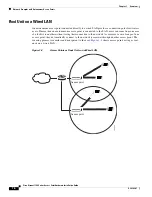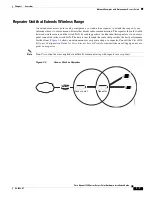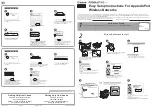
2-5
Cisco Aironet 1100 Series Access Point Hardware Installation Guide
OL-4309-07
Chapter 2 Installing the Access Point
Controller Discovery Process for Lightweight Access Points
Controller Discovery Process for Lightweight Access Points
The lightweight access point supports these controller discovery processes:
•
DHCP server discovery—Uses DHCP Option 43 to provide controller IP addresses to the access
points. Cisco switches support a DHCP server option. For additional information, refer to the
“Configuring DHCP Option 43 for Lightweight Access Points” section on page F-1
.
•
DNS server discovery—The access point uses the name
CISCO-LWAPP-CONTROLLER.<local
domain>
to discover the controller IP addresses from a DNS server. Where
<local domain>
is the
access point domain name.
•
Locally stored controller IP addresses—If the access point was previously associated to a controller,
the IP addresses of the primary, secondary, and tertiary controllers are stored in the access point
non-volatile memory. The process of storing controller IP addresses in access points for later
deployment is called priming the access point. For additional information, refer to the
“Priming
Lightweight Access Points Prior to Deployment” section on page E-1
.
For lightweight access points, Cisco recommends that you configure a DHCP server with Option 43 to
provide the controller IP addresses to your access points. Cisco switches provide a DHCP server option
that is typically used for this purpose.
Deploying the Access Points on the Wireless Network
Prior to beginning the actual access point deployment, perform these tasks:
•
Ensure that a site survey has been preformed.
•
Ensure that your network infrastructure devices are operational and properly configured.
•
For lightweight access points, perform these tasks:
–
Ensure that your controllers are connected to switch trunk ports.
–
Ensure that your switch is configured with untagged access ports for connecting your access
points.
–
Ensure that a DHCP server with Option 43 configured is reachable by your access points.
To deploy your access points, follow these steps:
Step 1
Obtain the access point location map created during your building site survey.
Step 2
Review the access point locations and identify the specific mounting methods required for each access
point location.
Step 3
For each access point perform these steps:
a.
For lightweight access points, record the access point MAC address on the access point location
map. When you have completed the access point deployment, return the access point MAC addresses
and the access point locations on the access point location maps or floor plans to your network
planner or manager. The network operators can use the MAC address and location information to
create maps for precise wireless system management.
















































